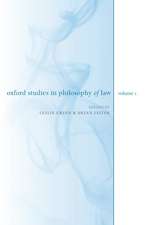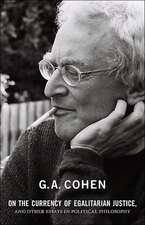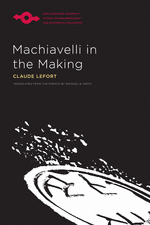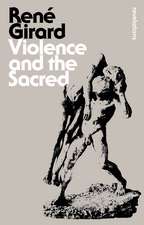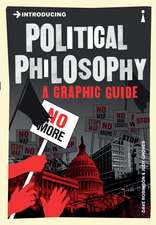Political Theory After Deleuze: Deleuze and Guattari Encounters
Autor Dr Nathan Widderen Limba Engleză Paperback – 25 apr 2012
| Toate formatele și edițiile | Preț | Express |
|---|---|---|
| Paperback (1) | 216.62 lei 6-8 săpt. | |
| Bloomsbury Publishing – 25 apr 2012 | 216.62 lei 6-8 săpt. | |
| Hardback (1) | 712.90 lei 6-8 săpt. | |
| Bloomsbury Publishing – 25 apr 2012 | 712.90 lei 6-8 săpt. |
Preț: 216.62 lei
Preț vechi: 244.21 lei
-11% Nou
Puncte Express: 325
Preț estimativ în valută:
41.45€ • 42.100$ • 34.56£
41.45€ • 42.100$ • 34.56£
Carte tipărită la comandă
Livrare economică 27 martie-10 aprilie
Preluare comenzi: 021 569.72.76
Specificații
ISBN-13: 9781441150882
ISBN-10: 1441150889
Pagini: 216
Dimensiuni: 138 x 216 x 15 mm
Greutate: 0.3 kg
Ediția:New.
Editura: Bloomsbury Publishing
Colecția Continuum
Seria Deleuze and Guattari Encounters
Locul publicării:London, United Kingdom
ISBN-10: 1441150889
Pagini: 216
Dimensiuni: 138 x 216 x 15 mm
Greutate: 0.3 kg
Ediția:New.
Editura: Bloomsbury Publishing
Colecția Continuum
Seria Deleuze and Guattari Encounters
Locul publicării:London, United Kingdom
Caracteristici
Published in a new series of introductory texts on Deleuze, making this key Continental thinker accessible to a student audience for the first time.
Notă biografică
Nathan Widder is Reader in Political Theory at Royal Holloway, University of London, UK. His previous publications include Reflections on Time and Politics (Penn State University Press, 2008) and Genealogies of Difference (University of Illinois Press, 2002).
Cuprins
Preface \ Abbreviations \ 1. The OntologicalTurn in Political Theory \ 2. Deleuze's Ontology \ 3. Deleuze's Nietzsche \ 4. Desireand Desiring-Machines \ 5. Micropolitics \ 6. Conclusion - Pluralism and 'ALife' \ Notes \ Bibliography \ Index
Recenzii
'Looking for the introduction to Deleuze and political theory? You've found it. Nathan Widder gives the most clear and persuasive account of why Deleuze's philosophy matters for contemporary political thought. He situates this significance through an outstanding account of the place of Deleuze among historical and contemporary theories and figures, notably Hegel, Nietzsche and Lacan. The book also explains how Deleuze announces a new departure for political action and critique. In addition to a wonderful array of concrete examples, the book supports its arguments through an exemplary reading of Deleuze's works. A joy to read, and a joy to apply...'
'Nathan Widder provides a remarkably accessible introduction to Deleuze's ontology and its implications for political thought. He explains Deleuze's distinctive contribution to contemporary political theory, namely that 'we are micropolitical before we are political,' by way of an informative tour through some of his most difficult texts, including Difference and Repetition, Nietzsche and Philosophy and Anti-Oedipus (co-written with Guattari). This book is an indispensable handbook to Deleuze's key concepts that will be of interest to beginners as well as advanced students of Deleuze's thought.'
I have been perhaps a little too scant in my acknowledgement of the achievement of Widder's book. I don't mean to suggest that this is only a student handbook (though it can be profitably so used); besides specific passages -- particularly its treatment of Hegel, Lacan, and Foucault -- from which specialists can benefit, the drive to construct a narrative that is both readable and appropriately detailed is praiseworthy and certainly enough to hold the specialist's attention throughout.
'Nathan Widder provides a remarkably accessible introduction to Deleuze's ontology and its implications for political thought. He explains Deleuze's distinctive contribution to contemporary political theory, namely that 'we are micropolitical before we are political,' by way of an informative tour through some of his most difficult texts, including Difference and Repetition, Nietzsche and Philosophy and Anti-Oedipus (co-written with Guattari). This book is an indispensable handbook to Deleuze's key concepts that will be of interest to beginners as well as advanced students of Deleuze's thought.'
I have been perhaps a little too scant in my acknowledgement of the achievement of Widder's book. I don't mean to suggest that this is only a student handbook (though it can be profitably so used); besides specific passages -- particularly its treatment of Hegel, Lacan, and Foucault -- from which specialists can benefit, the drive to construct a narrative that is both readable and appropriately detailed is praiseworthy and certainly enough to hold the specialist's attention throughout.












